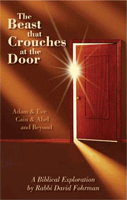 Iran’s Attack on Israel
Iran’s Attack on Israel


3 min read
4 min read
4 min read
10 min read
When giving a thank you gift there is always the danger that our intentions may be to insure our place in the relationship, rather than express our gratitude.
"Its teshukah is for you, yet you can rule over it" (Genesis 4:7).
If the yetzer of Cain is the drive to create, the passion to plant crops and create in partnership with God, what would it mean for Cain to "rule over" this?
The answer, I think, takes us back to Thomas Edison and the Glassblower.
The glassblower was fired with the passion to create in partnership with Edison. The crucial question, for him, was: How would this affect his relationship with Edison? Would it destroy that relationship or enhance it? It would all depend on whether the glassblower could "rule over" his passion, or whether his passion would rule over him.
If the glassblower is consumed by his desire to create with Edison, if he is held in its thrall -- well, that alone is not sinful, but "sin," as it were "lies crouching at the door." As we discussed earlier, the glassblower may find himself looking at Edison merely as a tool to realize his own creative ambitions. His goal in giving a gift to Edison would thus become little more than bribery, a bald faced attempt to ensure that the inventor does not get himself another glassblower.
And so it might be with Cain. When the drive to join God in the act of creation is left undirected, it can slowly become an obsession, a powerful, gnawing, end in itself. When this happens, anything can be sacrificed on its altar -- even, ironically, Cain's relationship with God Himself. If I see God as a necessary instrument to make my creativity flourish, to let my crops grow, I may relentlessly try to "buy Him off." As I reach brazenly for the keys to the Heavenly Cookie Jar, I'll give God plenty of gifts -- but gifts of a curiously "average" quality. I offer to my heavenly partner only that which is necessary to ensure his continued co-operation in our mutual endeavor.
There is, however, another alternative. Cain, like the glassblower, has a choice to make. Rather than be controlled by the monumental passion to create with God, I can rule over it. I can direct the fearsome power of this force. I can direct it towards the heroic stance we call gratitude.
If Cain can but steer his passion, it will become an engine for something profoundly positive. The offering that Cain gives will not be about bribery, but about overwhelming gratitude. It will not be a crass attempt to ensure that the keys to the Heavenly cookie jar always remain comfortably within reach. It will be something infinitely more valuable -- a humble expression of appreciation for letting me share in the secret of creation with my Creator, the Creator of All.
Roses for Dad and Mom
The difference between the two stances, and between the impact each has on the relationship between creature and creator, could not be more significant.
When Sam and his fiancée arrive at his parents' home for their first visit since Sam graduated from medical school, mom and dad are flattered to notice that the couple has brought them flowers. But what do the flowers mean? Mom and dad have spent a good deal of toil and treasure to put Sam through medical school. If the flowers are expressions of gratitude, if they signify their child's deeply felt recognition of the great gift they have given to him -- well, there is nothing that warms a parent's heart more than this. Such a gift contributes powerfully to the quality of the relationship between parent and child.
But what if the roses are not about gratitude? Sam and his new bride will look to his parents for much help in the future, as they struggle through years of internship and residency. What if the flowers are a calculated attempt to keep mom and dad happy? What if Sam and his bride are giving a perfunctory, average gift that will serve nicely, they hope, as an insurance policy to ensure dad and mom's continuous support?
A gift that is a mere insurance policy demeans the relationship between parent and child.
There is no greater heartbreak than receiving a gift like this. One wonders whether perhaps it is better to give nothing at all. A gift that is a mere insurance policy demeans the relationship between parent and child; it cheapens the natural love of a creator for his offspring by turning that love into a mere commodity to be hoarded, to be squirreled away for a rainy day. Worse, it turns the creator into a mere tool of the child's creativity, a creativity that ultimately becomes self-centered and self-serving. The creator becomes nothing but a pawn in a great chess game that revolves insidiously around the ever expanding ambitions of the child.
Cain brings the quintessential "average" gift to His Creator, and the Almighty, the Great Parent in the Sky, takes Cain aside to have a little talk with him about all this.
"Why are you angry and why has your face fallen?" he asks Cain. Your anger and depression are out of place, for the ball is entirely in your court: "If you do well," if you guide your powerful desire to create along with Me, "you can lift up [your face]." A gift that expresses gratitude will always be accepted by your Creator, and you can look yourself in the eye in the mirror after giving it. "But if you do not do well," if you fail to steer your passion, if you adopt a position of neutrality, then "sin lies crouching at the door." You risk sacrificing our very relationship on the altar of blind creativity. "The teshukah of your passion is for you, yet you can rule over it;" you can transform its raw power into gratitude; into something that enhances, rather than destroys, our relationship.
Cain does not listen. He persists in his insistence that the source of his problems lay outside of him; that he has been victimized by someone else, anyone else. He cannot kill God for failing to accept his gift -- the Almighty is impervious to arrows and spears -- so he does the next best thing. He lashes out in a different direction, killing Abel, the brother whose offering found favor with his Maker.
Cain's rage, like the surging creativity inside him, is blind: His act of murder does not appear premeditated; it seems spontaneous.1 Indeed, the sages tell us that Cain killed "inadvertently." He did not know that his violence would destroy Abel, as the ultimate fruits of physical brutality were, at the time, a great unknown.22 No one had ever been killed before. Tragically, perhaps Cain is being truthful when he tells God that he simply does not know where Abel is anymore. But none of that matters; what is done is done, and cannot be taken back. Abel's blood cries out from the ground. Creativity has caught up with Cain. It is no longer crouching at the door. It has sprung, and has devoured both killer and victim within its jaws.
The Core of the Triangle
At long last, we are finally in a position to see the global picture, the composite portrait being painted in these first two human dramas in the Book of Genesis, the sagas of the Forbidden Fruit and the World's First Murder. As we have seen, both stories revolve around the proper role of passion in the psyche of humankind. Failure in one story brought death into the world in theory; and failure in the other brought death into the world in practice. Failure in each story brought exile, difficulty farming, and hiding from God.
As we argued before, the stories of Adam and Eve and Cain and Abel are closely connected; the latter story doesn't just happen to come after the former one; it really is its sequel, conceptually and thematically. A process starts in the first of these stories, and that process takes another step in the second story. And each of these steps is accompanied by three, inter-related consequences: Exile, difficulty farming and hiding from God.
As we draw to a close our meditation on these stories, we might wonder: "Why?" Why, in fact, does failure to wield passion properly, failure to properly harness the fiery will to create -- why does this kind of failure lead to these particular consequences?
We began to consider this question towards the end of our last series, Serpents of Desire. But I think we are in a position to understand this more deeply now.
Before next week, I'd like you to stop and think about these three things: Exile, difficulty farming, and hiding from God. Ask yourself: How, if at all, are these things related to one another? What is the core of this three sided triangle? Is there a common drum to which they all beat?
I think that there is. We'll talk about it next week.
1 The Torah states that before Cain killed Abel, both brothers were in the field, and the beginning of a conversation ensued between them. But it was only the beginning of a conversation. Most translations will render the action leading up to murder in something like the following terms: "Cain spoke to Abel, and it happened, when they were both in the field, [that] Cain came upon Abel and killed him." The problem is though, that the Hebrew term for Cain's speaking to Abel is not vayedaber but vayomer, which means that the text does not really translate as "Cain spoke to Abel" but "Cain said to Abel." This, however, creates a non-sequitor: If I tell you that x spoke to y, I don't need to tell you what was said between them, but if I tell you that x said to y, I do have to tell you what was said, or else the sentence is incomplete. The sense of the verse, therefore, is of an interrupted conversation; that Cain started saying something to Abel, and by rights, we should hear what it is -- but before actually getting to it, Cain interrupted what he was saying and killed Abel instead. The murder was an impulsive, violent end, perhaps, to something that perhaps could have been resolved through mere words.
2 According to one Midrash (Midrash Rabbah, Deuteronomy 2:26), this explains why Cain's punishment was exile. Later passages in the Torah set forth that a murderer who deliberately kills is subject to capital punishment, but one who kills inadvertently, or without full knowledge of what he is doing, is instead exiled from his land (see Numbers, 35:22-25). Cain's exile, according to the Midrash, was the initial prototype of that law.
 This series is excerpted from Rabbi Fohrman's new book, "The Beast that Crouches at the Door: Adam and Eve, Cain and Abel, and Beyond." To purchase a copy visit www.jewishtextstudy.org or visit www.amazon.com
This series is excerpted from Rabbi Fohrman's new book, "The Beast that Crouches at the Door: Adam and Eve, Cain and Abel, and Beyond." To purchase a copy visit www.jewishtextstudy.org or visit www.amazon.com
